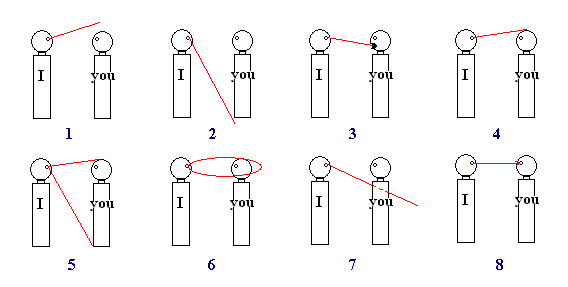|
English's Infamous
Phrasal Verbs
Introduction to Phrasal Verbs
(this is a work in progress)
| Many learners of English may wonder how to distinguish a particle
of a phrasal verb from a preposition or an adverb.
For instance, in the
sentence:
I look for you,
"for" is a particle of the phrasal verb: "look
for", and in the sentence:
I do something for you,
"for" is a preposition.
Quite simply, the difference is the first "for" has no
meaning by itself, while the second "for" has meaning by
itself. In essence, prepositions have meaning, particles don't.
Being able to distinguish particles and prepositions, should
not be very difficult, because prepositions MUST have nouns after
them. But, distinguishing particles from adverbs can be
very difficult. For instance, in the sentence:
I put my clothes on,
...Is "on" a particle of a phrasal verb, or is it an adverb?
We must discern if "on" has meaning. If it has no
meaning by itself, then, it is a particle of a phrasal verb. If it has
meaning, it is an adverb. [Note: it cannot be a preposition,
because there is no noun (object) after it.]
In this case, it is debatable. Most grammarians would say that
it has no meaning, and therefore it is part of the phrasal verb
"put on".
I suggest that it actually DOES have meaning... It tells us
WHERE I put my clothes... I put my clothes on my body.
Also, most phrasal verbs have an equivalent, which is NOT a phrasal
verb, but has exactly the same meaning. However, "Put one's
clothes on" does NOT have any equivalent. This is added
support that "on" is an adverb, just as "down" in
"put the book down."
The aim of this page is to help learners of English recognize
particles of phrasal verbs by contrasting them with the prepositions OR
adverbs of
the same spelling. |
|
Abbreviations Used Herein Below
adv = adverb
o = object of sentence verb
prep = preposition
pph = prepositional phrase
s = subject
v = verb
v.i. = intransitive verb (no object of
this action)
v.t. = transitive verb (object
required for this action) |
SAMPLE 1: "Look
at"
One of the most difficult words, perhaps, to distinguish would be
"at" in the following sentence:
I look at you.
In the above sentence, is "at" a particle of a phrasal
verb, or a
preposition. Which is correct:
[I] + [look at] + [you]. or
[I] + [look] + [at you]. ???
In order to answer that question, we must figure out
whether "at" has any meaning.
It might seem to some learners that it has none. But, it does.
Refer the diagrams below:

1. I look above you.
2. I look below you.
3. I look in you.
4. I look on you.
5. I look upon you.
6. I look around you.
7. I look through you. (figurative)
8. I look at you.
"At" has meaning, just like all the other prepositions
listed above.
[Note: some grammarians may disagree.
They are allowed to disagree. It is their prerogative to do so. This
grammarian has shown logically and with evidence that "at" in the
sentence "I look at you," functions as a preposition.]
SAMPLE 2: "Put +
_________"
The verb "put" causes many problems for native English
speakers and non-native English speakers as well. Look at
the following sentences and try to decide which ones have phrasal verbs and
which ones don't. TEST YOUR KNOWLEDGE:
1. Put on your shoes.
2. Put your shoes on.
3. Put your shoes on the floor.
4. Put your hands on your shoes.
5. Put the garbage out.
6. The car puts out a lot of pollution.
7. He put me out 100 dollars.
8. He put his hat off the table.
9. She put off her homework.
10. Put down that book.
11. Put that book down.
12. He put me down.
13. Don't put people down.
14. Put up that book.
15. Put that book up.
16. Can you put me up for the night?
17. I can't put up with that crap!
Answers:
[Note: There are different kinds of adverbs. For tutorial,
please click here.]
1. on = sentence adv
2. on = verb adv
3. on the floor = pph
4. on your shoes = pph
5. out = adv
6. put out = phrasal verb [meaning: emit]
7. put out = phrasal verb [meaning: cost]
8. off the table = pph
9. put off = phrasal verb [meaning: postpone]
10. down = verb adv
11. down = sentence adv
12. "put down" has two meanings:
(12a) literal meaning: opposite of "pick up";
down = adv
(12b) figurative meaning: insult; "put down"
= phrasal verb
13. same as 12
14. nonsense.
15. up = adv
16. put up = phrasal verb [meaning: give room and board] +
for the night = pph
17. put up with = phrasal verb [meaning: tolerate]
The last two are very interesting samples of English.
In #16, we see TWO preposition-like words in a row: up for
In #17, we also see TWO preposition-like words in a row: up with
Whenever ones sees TWO prepositions in a row, one knows there is
a phrasal verb. The question is: Is it a two-part phrasal verb or a
three-part phrasal verb?
In #16, the word "for" IS a preposition in the phrase:
for the night.
In #17,
the word "with" is a particle (of a phrasal verb: put up with [meaning:
tolerate]).
Any Questions?
Isn't English interesting?!!!
Well, I think it is. Please,
feel free to contact me with grammar
questions.
|